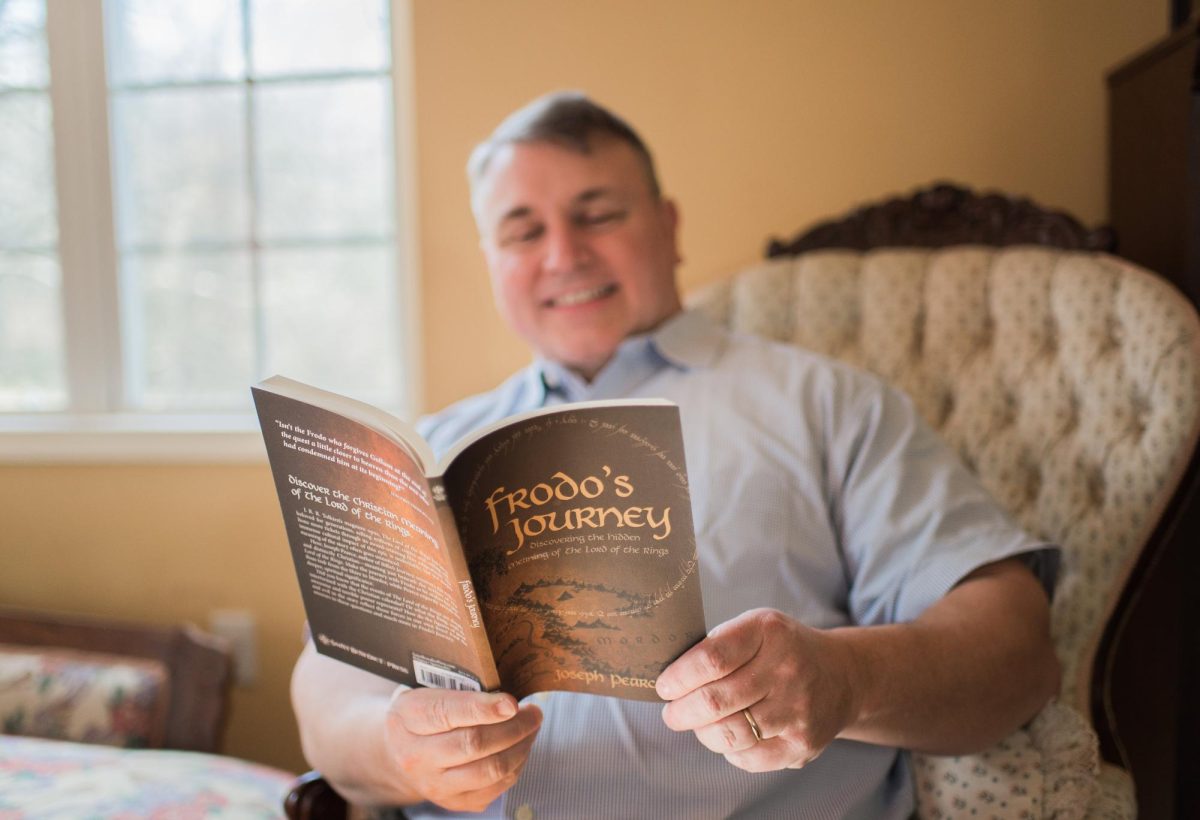On Monday, Oct. 7, the Robinson Teaching Theater was packed beyond capacity with people coming to see best-selling author Joseph Pearce’s lecture on “The Christianity of The Lord of the Rings” before doing a book signing. According to his introduction in the event program, “Joseph Pearce is the internationally acclaimed author of many books.” Some of his literary works include “C.S. Lewis and the Catholic Church” and “Frodo’s Journey: Discovering the Hidden Meaning of The Lord of the Rings.” His website’s ‘About Joseph Pearce’ page also said, “He has hosted two 13-part television series about Shakespeare on EWTN, and has also written and presented documentaries on EWTN on the Catholicism of ‘The Lord of the Rings’ and ‘The Hobbit.’” Currently, he’s a visiting professor at Ave Maria University, where he teaches literature and runs a program called “The Genius of J.R.R Tolkien.”
In his talk at Whitworth, Pearce drew many connections between the fictional world — Middle Earth — that J. R. R. Tolkien created and the real world that his readers live in. The monotheistic world of the series, the nature of the hobbits and the interaction with the ring which alludes to sin are all points that Pearce made in his lecture.
He first started by explaining how Middle Earth is monotheistic — believing in one God, Eru Ilúvatar, just as Christianity does. The origin story of Middle Earth includes phrases like “In the beginning” which matches Genesis 1 and also includes singing much like the Narnia series, by C.S. Lewis. When discussing the nature of the hobbits, he used many Latin words to explain how the hobbits are prideful and prefer comfort over difficulty, much like humans are. He mentioned that our desire to look upward, and our desire for safety, are battling in us and that is Frodo’s first obstacle.
Pearce then discussed the need for the character Gollum, the villain in the series, to actually complete Frodo’s quest- to get rid of the ring. He also mentioned that the ring was a symbol of sin because of how it tempts anyone who wears it to seek power. This is how Pearce brings in Gollum’s redemption arc and the other characters’ journeys toward forgiving Gollum for his mistakes. That grace is a major sticking point in the Christian lens of ‘The Lord of the Rings.’
The event itself was organized by Anthony Clark, a professor in Whitworth’s history department. “I thought it would be really important for people to know ‘The Lord of the Rings’ a little bit better from Tolkien’s point of view. I wanted them to access Tolkien, the author. So, this was [a] great inspiration. And then I have to admit, Joseph Pierce is just one of the greatest writers and speakers on this topic, and who wouldn’t want to get him on campus?” said Clark.
The ability to have Pearce on campus, according to Clark, is thanks to the Simpson Duvall Lecture series that “helped to bring him [Pearce]” all the way from South Carolina.
Pearce says that he was excited to come here for this lecture topic. “I came to Whitworth at the invitation of Professor Anthony Clark. Never having visited Whitworth before, I was delighted to have the opportunity to get to know the university and to meet with its faculty and students. Having now done so, I am enthused by my experience!” he said.
Pearce said many things about “The Lord of the Rings,” which surprised people. Gianna Caniglia, a first-year double major in English and theater, said that his take on the character Gollum surprised her. “I was a little bit surprised to hear about everything about Gollum. Not necessarily that Gollum was a representative of mankind. But how Gollum was a figure who acted as God’s hand in a way to help Frodo in the final bit of his journey because Frodo couldn’t do it. He couldn’t throw away the ring. But Gollum came in, even with his sinful nature, to be used by an omnipotent God for good. I never thought about it that way. And that was like a really cool twist that I loved during the talk,” she said.
Faith Buck, a local high school teacher, found the same thing interesting. “I love that reflection on that ability to love our enemies and how that brings us to God and how that allows God to work His plan,” said Buck.
Pearce had a valuable insight about “The Lord of The Rings,” and Buck also said, “’The Lord of The Rings’ is a very Christian book. There’s a lot of beautiful truth in that that can be learned. We can learn so much about ourselves and so much about God through the story.”
That is exactly what Pearce hoped the attendees got from his lecture. He said that he hopes people now understand how J. R. R. Tolkien put a “profoundly Christian ethos” into his books. “I hope […] they will have learned to see their own lives in a literary and not merely a literal sense. Like Frodo Baggins, each of us is also on the adventurous journey of life which is also the quest for heaven,” said Pearce.











